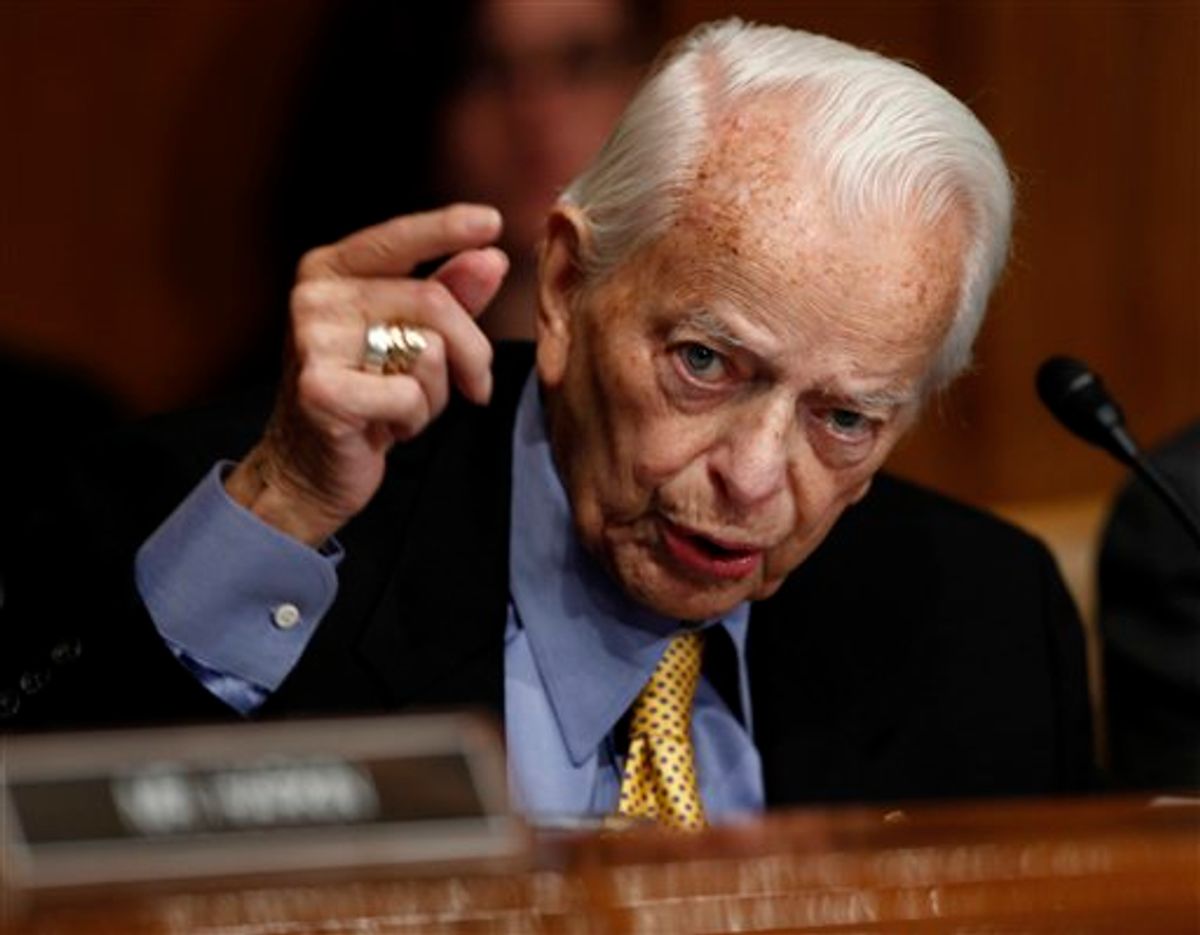Sen. Rand Paul just finished hour four of his real live filibuster against Obama CIA nominee John Brennan, and has now been joined by two colleagues. The reason it's attracted so much more attention than your average Wednesday afternoon Senate floor business is that talking filibusters are so uncommon these days. It's been three years since the last one, and was years before that for the predecessor.
Senators no longer need to actually do anything to filibuster, but that wasn't always the case. One-man talking filibusters used to be a common way for ambitious senators to leverage their power.
Infamous Louisiana Democrat Huey Long made aggressive use of the filibuster in the 1930s to advance his populist agenda, as well as personal one. On June 12, 1935, he started his personal best -- at 15 hours and 30 minutes, it was the second longest ever at the time, according to the official Senate history -- for a rather parochial agenda: He wanted to block his political enemies in Louisiana from getting appointments to lucrative government jobs.
But perhaps the most famous filibuster in Senate history -- aside from the fictional Jimmy Stewart rant in "Mr. Smith Goes to Washington" -- was delivered by a more unsavory character for a baser goal. As the AP reported: "Fortified with a good rest, a steam bath and a sirloin steak, Sen. Strom Thurmond talked against a 1957 civil rights bill for 24 hours and 18 minutes (you can read the whole thing here) -- longer than anyone has ever talked about anything in Congress before or since. Republican Sen. William Knowland called the speech "cruel and unusual punishment."
Thurmond told no one what he was doing and his staff started to worry when he began collecting whatever he could find to read from his office. Thurmond came armed with throat lozenges and at one point ducked into the coatroom to scarf down a sandwich while another senator asked him a question. A staffer waited with a pail just off the floor in case there was a bathroom emergency. The civil rights bill passed anyway.
Decades later, in 1992, Sen. Alfonse D’Amato had more luck when he literally talked until Congress ended. The New York Republican, who was known for reading the District of Columbia phone book during his filibusters, finally ended his 15-hour filibuster the morning after it began when he learned the House of Representatives adjourned, thereby killing any chance of getting an amendment he wanted added to a bill, but the move was credited with helping him win reelection.
D'Amato also holds the record for the second-longest filibuster ever, against a military funding bill in 1986, which came in 23 hours, 30 minutes. Next up in length was Sen. Wayne Morse of Oregon, who spoke for 22 hours, 26 minutes against an oil bill in 1953. In the three spot was Long, followed by D'Amato's 15-hour rant.
The fifth-longest filibuster came in 1964 when Democratic Sen. Robert Byrd railed against the Civil Rights Act of 1964 for 14 hours and 13 minutes. It was a legacy that haunted him late into his career when he stood on the stage to applaud the inauguration of the country's first black president. Ironically, it was Byrd who also did away with the old filibuster and created the modern system.
While there are no reports of anyone having health issues while filibustering, an Arizona lawmaker did collapse while speaking on the state House floor in 2006.
It didn't rank among the top five longest filibusters of all time, but Sen. Bernie Sanders won applause from the Occupy movement for his eight and half hour filibuster in 2010 against extending the Bush-era tax cuts. The transcript of Sanders' remarks was even made into a book: "The Speech: A Historic Filibuster on Corporate Greed and the Decline of Our Middle Class."
The Vermont independent spoke forcefully, despite his age, and set the modern standard, which Paul is following today. Asked what he thought about Paul's speech, a spokesperson for Sanders said only, "Sen. Sanders said during the time when filibuster reform was under consideration at the beginning of the 113th session of Congress that he supported the right of a senator to speak on an issue for as long as they wish."
Senate Democratic reformers like Jeff Merkley and Tom Udall had hoped to reform the filibuster by making talking filibusters like this more common. The idea was that it would raise the bar for filibustering, curbing the kind of obstruction for obstruction's sake that has become too common in recent years.
Talking filibusters also help call attention to the issue, making it harder for senators to sweep needless obstruction under the rug. For instance, Republicans filibustered an appellate court judge, but because they didn't have to talk, hardly anyone noticed.



Shares